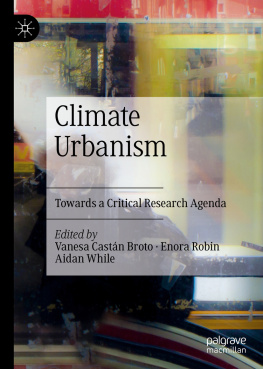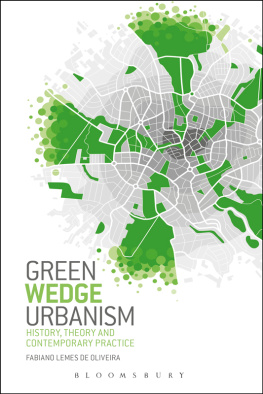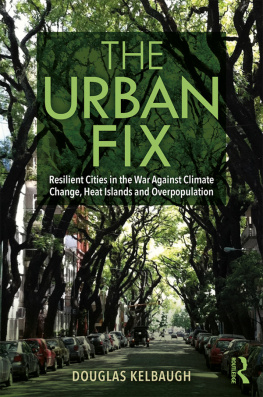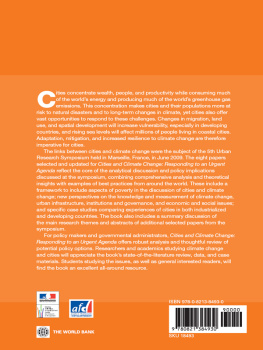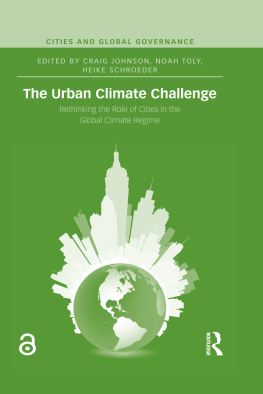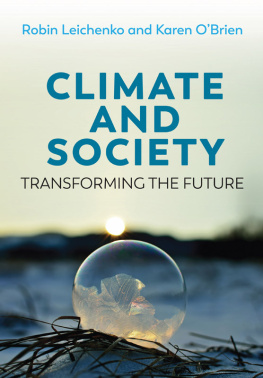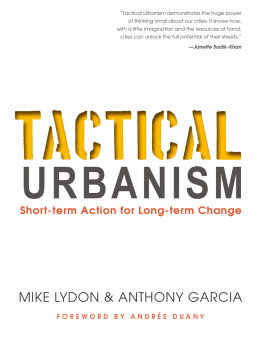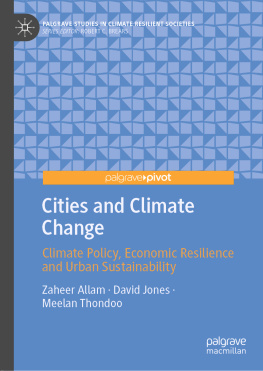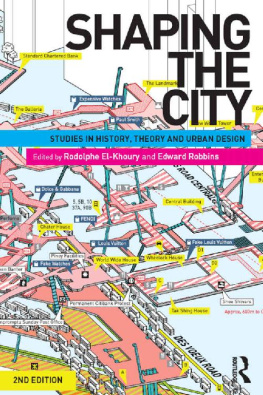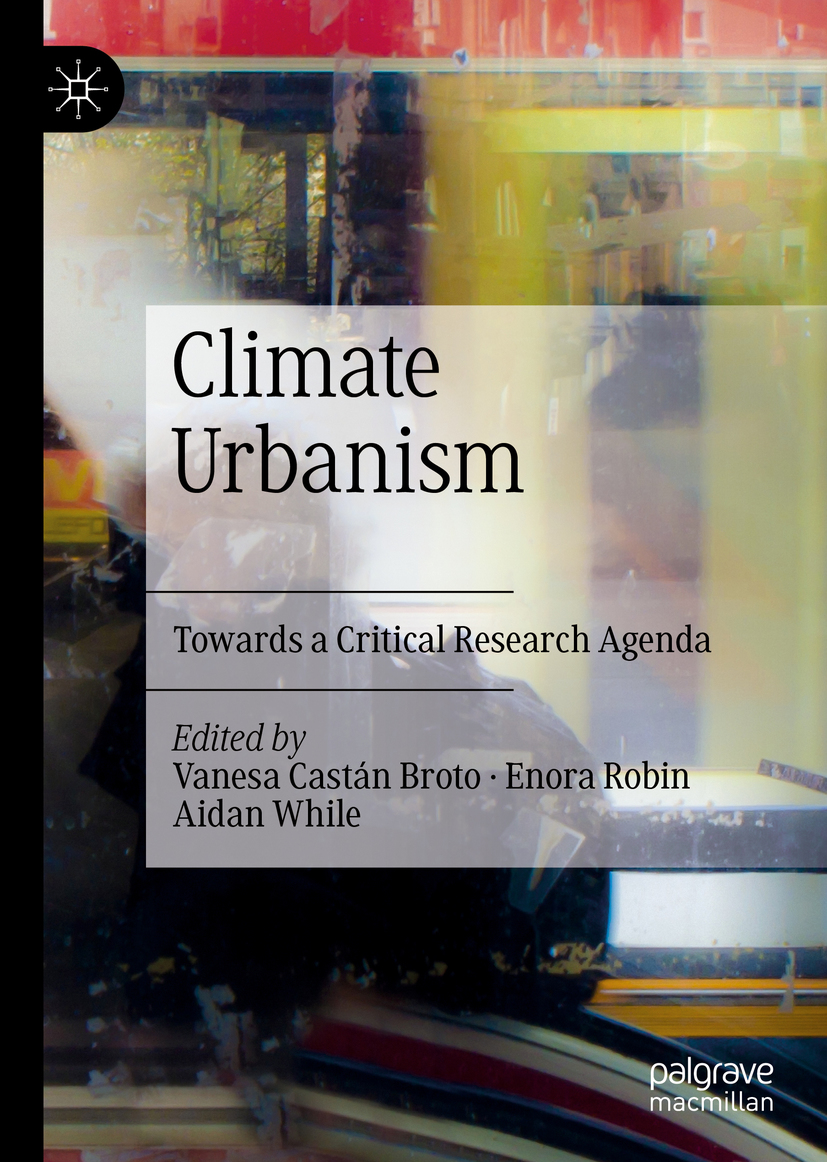Editors
Vanesa Castn Broto , Enora Robin and Aidan While
Climate Urbanism
Towards a Critical Research Agenda
1st ed. 2020

Logo of the publisher
Editors
Vanesa Castn Broto
Urban Institute, University of Sheffield, Sheffield, UK
Enora Robin
Urban Institute, University of Sheffield, Sheffield, UK
Aidan While
Urban Institute, University of Sheffield, Sheffield, UK
ISBN 978-3-030-53385-4 e-ISBN 978-3-030-53386-1
https://doi.org/10.1007/978-3-030-53386-1
The Editor(s) (if applicable) and The Author(s), under exclusive license to Springer Nature Switzerland AG 2020
This work is subject to copyright. All rights are solely and exclusively licensed by the Publisher, whether the whole or part of the material is concerned, specifically the rights of translation, reprinting, reuse of illustrations, recitation, broadcasting, reproduction on microfilms or in any other physical way, and transmission or information storage and retrieval, electronic adaptation, computer software, or by similar or dissimilar methodology now known or hereafter developed.
The use of general descriptive names, registered names, trademarks, service marks, etc. in this publication does not imply, even in the absence of a specific statement, that such names are exempt from the relevant protective laws and regulations and therefore free for general use.
The publisher, the authors and the editors are safe to assume that the advice and information in this book are believed to be true and accurate at the date of publication. Neither the publisher nor the authors or the editors give a warranty, expressed or implied, with respect to the material contained herein or for any errors or omissions that may have been made. The publisher remains neutral with regard to jurisdictional claims in published maps and institutional affiliations.
Alex Linch shutterstock.com
This Palgrave Macmillan imprint is published by the registered company Springer Nature Switzerland AG.
The registered company address is: Gewerbestrasse 11, 6330 Cham, Switzerland
In times of a fast-changing world characterized by growing population, environmental change, biodiversity loss, contested economic structures, frequency of natural hazards and climate change, it is time to not only act but also ponder about possible futures in a planet of cities. This book is a timely addition, as a text that walks us through a soul-searching process on the blunt of climate change on cities and how city futures can be shaped. The authors highlight that there wont be a single vision for future cities but multiple futures and contextually based. The examples take us from climate concerns to how social systems, urban infrastructure and institutions can be reconfigured to design city futures that address climate threats that are just and inclusive in a new climate urbanism. The climate urbanism that this book examines in detail illustrates how important and critical cities are to respond to the climate urgency. That education, training and new professionalism is important for visioning and shaping future climate urbanism.
An academic and provocative book that is a good source for education, training and curriculum development and for readers interested in policy transformation for city futures that is socially transformative climate urbanism driven by social movements across cities in both Global North and South.
This is the material for city futures.
Shuaib Lwasa, Associate Professor, Department of Geography Geoinformatics and Climatic Sciences, Makerere University
With the outskirts of major cities still scorched by the devastating 20192020 fires season and major environmental issues in question at the heart of the COVID-19 crisis, there might be no better time to reform our climate approaches in cities. In Climate Urbanism Robin, While and Castn Broto prompt us to do so in a critical and progressive way. The volume seeks to make amend to the limits of climate-focused urban research, and to draw up a new agenda for action. In doing so they chart, collaboratively in dialogues with seventeen authors, what a research and action agenda for a climate urbanism proper would look like. Rich in insights, both theoretical and empirical, emanating from a variety of viewpoints and experiences, from Colorado Springs and Maputo to Nepal via Malawi, from resilience and risk to the role of local governments in international policy via intergenerational learning, the volume is a truly refreshing mix of expertise with an explicitly transformative aim. Centrally, Climate Urbanism does so as a new communal project asking us, academics, practitioners and even the broader public not to forget that urbanism is a broader undertaking that emergences from recognition of its multiple interpretations, and that there is no one single solution available out there. Progressive, emancipatory and explicit about its own contradiction, the book is just exactly the kind of urbanism it advocates, and one that is much needed at a time of profound crisisreally a must read for anyone itching to get out there and build a different kind of urban life.
Prof Michele Acuto, Director of the Connected Cities Lab, University of Melbourne
A critical and novel contribution from top climate social scientists examining the potential and contradictions of climate urbanism for an environmentally just and transformative development.
Isabelle Anguelovski, ICREA Research Professor and Director, Barcelona Lab for Urban Environmental Justice and Sustainability, Universitat Autnoma de Barcelona
Climate Urbanism: Towards a Critical Research Agenda provides a fresh lens through which to interpret the contours of urban change induced by living with and responding to climate change. The books agenda is both generative and critical. By unpacking climate urbanisms underlying rationalities, contestations, knowledge frames, socio-material and politico-institutional forms, the book exposes the diversity of experiences from which new understandings of climate-related urban change must be developed. It offers no easy answers, but makes clear that producing just forms of climate urbanism will demand interdisciplinary knowledge that is both receptive to diverse urban experiences and acutely attuned to the politics inherent in climate-related urban change. The book poses challenging new and incisive questions of urban researchers and practitioners alike, while also suggesting productive new entry points for intervention.
Prof Pauline M c Guirk, Director, Australian Centre for Culture, Environment, Society and Space (ACCESS), University of Wollongong NSW, Australia
Acknowledgements
This book emerges from the debates held at the international workshop The New Climate Urbanism: exploring the changing relationship between cities and climate change that took place at the University of Sheffield on September 45, 2019. As editors, we are enormously thankful to Victoria Simpson and Ryan Bellinson for their help in organising this event. We are also indebted to all the chapter authors who both presented their work at the workshop and then bought into our project to make an accessible book on a challenging topic. We would like to extend our thanks to all the contributors to the workshop, including those who were not able to participate in the final book. The debates at the workshop helped in structuring the book and all contributions benefitted from the conversations we had. We would also like to thank those who for different reasons could not attend the workshop at the last minute, especially Harini Nagendra. Our thanks go to Linda Westman, Ping Huang, Hita Unnikrishnan, and Erika Conchis for making our Climate Urbanism research theme what it is: a collegial, friendly, and stimulating research group committed to think about climate change and cities from new locations and disciplines. We are also enormously thankful to all our colleagues and visiting fellows at the Urban Institute who have created a vibrant intellectual atmosphere where our group on Climate Urbanism has thriven and grown: Simon Marvin, Rachel Macrorie, Beth Perry, Bertie Russel, Jonathan Rutherford, Jonathan Silver, Victoria Habermehl, Sophie King, Andy Lockhart, Miguel Kanai, Michele Lancione, Abdoumaliq Simone, Pauline McGuirk, Sam Burgum, Tom Goodfellow, Lindsay Sawyer, Irit Katz, Rowland Atkinson, and Zarina Patel. Finally, we would like to thank the individuals in the Faculty of Social Sciences, University of Sheffield, who have made this project possible through their friendship and ongoing support: John Flint, Craig Watkins, Dorothea Kleine, Dan Brockington, Sarah Salway, Charlie Burns, and Nathan Hughes. This project was supported by the Leverhulme Trust (2016 Philip Leverhulme Prize on Geography).

